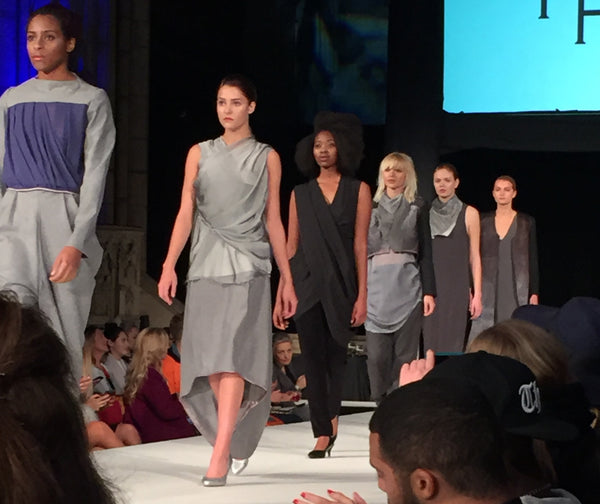
The discussion has been renewed this year, with Givenchy offering up 820 tickets to the public for the brand's show in New York Fashion Week, of whether or not the Big Four (New York, London, Paris and Milan) fashion weeks should continue to be exclusive, invite-only events versus taking fashion week public. We first noticed some high-profile contemplation on the matter in the form of a pair of articles on i-D, one by Mallory Rice arguing the merits of opening up the shows to the public and the other, by Anders Christian Madsen, on why it is important to keep the shows exclusive. Before we get into our thoughts on the matter, lets take a walk down memory lane back to the roots of the Big Four.
While catwalk shows had been happening for decades, the first official Fashion Week (or Press Week as some called it at the time) happened in New York in 1943. As the second World War was raging in Europe, it made sense that not many people were willing to travel to the world's fashion capital at the time, Paris, to see what to expect from the next season's trends. The powers that be in American fashion at the time also wanted to show that they no longer relied on the couturiers in Paris for style and design inspiration. This first fashion week was mostly a press event for fashion journalists, such as Vogue which had until then previously been filled by Parisian designers. Following on from New York, Milan inaugurated their first official Fashion Week in 1958 followed by Paris in 1973 and most recently London in 1984, all with the focus of showing off the latest collections to the press and fashion buyers in order to secure sales. Since then, there have been many iterations of fashion weeks added in smaller fashion conscious cities, even variations focusing exclusively on sustainability or menswear.. there's even a Christian Fashion Week in Florida every year now (you can see what Buzzfeed thought about that one here).
Now down to our opinion on the matter.
I think to properly answer the question, we have to consider what is the purpose of Fashion Week anymore? Some would argue that it has become a form of entertainment, evidenced by the fact that WME/IMG (a talent and literary agency) bought the rights to NYFW and have stated that they see sport, fashion, movies, TV and books all as forms of entertainment. While at inception, fashion week was a way for designers and brands to get their latest collections in front of press for critique and buyers to place orders, one could argue that now fashion week is more of a production, an experience. Alexander McQueen's shows were known for their performances, everything from the set design to the music were there to aggrandise the clothes even though the pieces on the runway were rarely seen hanging in any store. And while "runway pieces" are not often available for purchase by the public, we can't help but argue that any attempt to continue to show fashion as a true art form is good for both business and the art of fashion as a whole.
While we love the idea of fashion week as much as anyone, we do have a few issues with the whole idea as it is now. First, with the massive overconsumption we now see given how fast fashion has taken hold, we feel that the seasonal fashion week's lead to a need for the newest, hottest styles to market and to people completely dumping their closets every season to start fresh. The more available these exhibitions become, the more the styles are interpreted by the big fast fashion chains, we are only seeing greater consumption. Another issue is the role of the celebrity in fashion week. It is rumoured that some A-listers are paid a lot of cash to attend the shows. What is the point? While they are influencers, they are rarely decision makers in how a collection is reviewed by press or stocked in stores by buyers. In our opinion, the dog-and-pony show the celebrities create by attending fashion week stands to overshadow the purpose of the shows or draw attention away from the designers' collections.
Another point, each venue only has so many seats. As these events are supposed to be press events or trade shows, would it even make sense for the general public to be invited in? Social media, such as the New York Fashion Week app or Burberry who revolutionised the experience by streaming the show live online, and other efforts, like the giant screens erected in Golden Square during London Fashion Week, give a greater number the opportunity to, if even only second hand, experience the hype of fashion week in the big cities. One route some of the less sought-after fashion weeks have gone down is to have ticketed events. Brighton Fashion Week (which we had the pleasure of attending) and Berlin Alternative Fashion Week, as a couple of examples, are still open to press and industry buyers but also sell tickets to the public in order to open up the shows for maximum exposure.
As fashion is art and art should be available for everyone to enjoy, it should be open for everyone to enjoy. And while there are bloggers, editors, critics and buyers who have a job to do, there has to be a happy medium. As with Brighton Fashion Week, there are seats reserved for those in the industry while the rest are on sale to the public. This allows the everyday fashion lover to experience the performance of fashion week as well as those who need to get some work done to do so.
Would you go to fashion week if it were open to the public? How much would you be willing to spend on a ticket?
